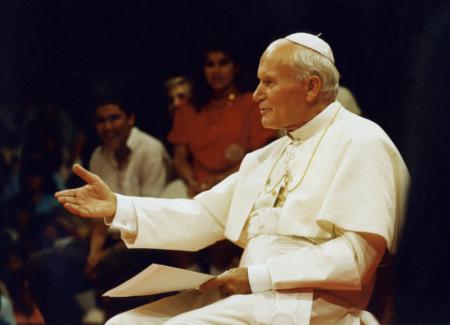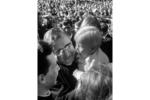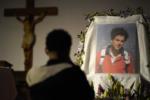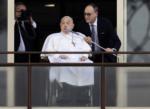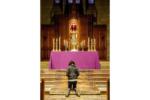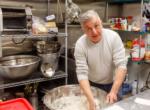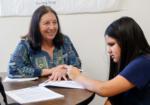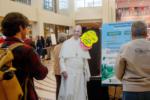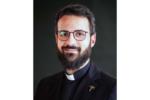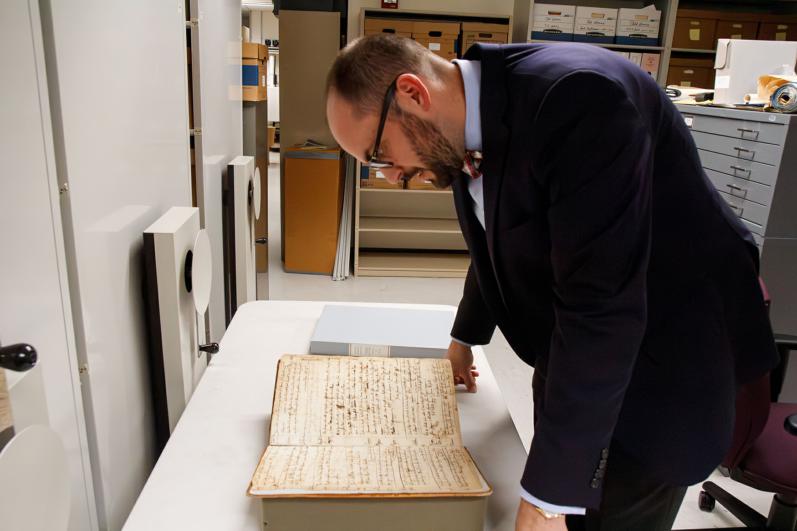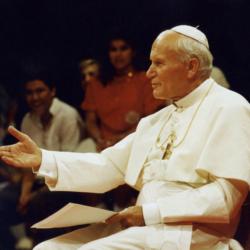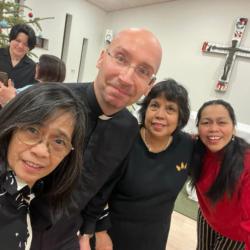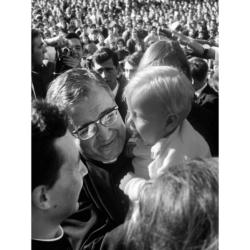Archdiocesan archivist helps lead effort to uncover Church records of the enslaved
BRAINTREE -- The brown ink, handwritten in Latin, bleeds through the thin, yellowed paper of the baptismal record. The record is so old that it predates the establishment of the Diocese of Boston in 1808. Back then, the diocese was a mission, and the Cathedral of the Holy Cross, where this record is from, was simply known as the Chapel of the Holy Cross.
Thomas P. Lester, director of the Archdiocese of Boston Archive and Library, carefully runs his finger along the text to find the names he is looking for.
"It's a pain to pick through the Latin," he explains.
In the messy cursive scrawl, he finds it: Jan. 25, 1790. Lucius, John and Mary, children of Peter and Rebecca of Bristol, Rhode Island, are baptized, in the presence of their sponsors. Beside the names of the sponsors are the words "Tres servi in hoc oppido."
While those words could translate to "Three servants in this town," Lester believes that it translates to "three slaves in this town."
It is unknown whether those words refer to the baptized or their sponsors. Their stories -- their last names, their family history, their social status, and their eventual fates -- seem to end there. Like many enslaved people in the historical record, their lives are mysteries illuminated only by scant fragments.
"This might be the only written record of someone," Lester said.
Fragments of the enslaved can be found in diaries, census records, pension records, financial ledgers, personal letters, property records, court records, last wills and testaments, newspaper clippings, and, of course, sacramental records. These records of one of the darkest chapters in America's history are not just the property of museums and libraries, but of dioceses and religious orders. Priests, bishops, and members of religious orders were among slaveholders, and in some places, the enslaved built and maintained Catholic churches, hospitals, schools, and residences.
"I think it's important that we acknowledge it's a part of our history," Lester said, "and if we want to tell a more complete history, we need to look at this."
Lester is one of the inaugural members of Catholic Religious Organizations Studying Slavery (CROSS), an organization of dioceses and religious orders that seeks to increase access to records of slavery within America's Catholic Church. Lately, Lester has been combing through the Archdiocese of Boston's archives to find evidence of enslaved people. Nationwide, such records will be used to increase education and discussion within dioceses and the communities they serve.
"What we're really trying to do right now is support archivists who have collections of the enslaved in their archives," Lester said, "Catholic archivists in particular . . . There's a body of research on people who were enslaved by the Catholic Church."
The goal of CROSS is to make records of slavery within the Catholic Church more easily accessible both online and in person, especially for descendants of the enslaved who want to research their family trees. Sacramental records of enslaved people provide information about marriages and children that are difficult to find elsewhere.
"We just think they should be open so that people can connect with them," Lester said, "and to understand the Catholic Church and its history."
CROSS aims to improve the way that research on slavery in the Church is done and facilitate an honest inquiry on how the Catholic Church contributed to the history and legacy of slavery in America. The group wants to help archivists find records of slavery and put them in their proper context -- multiple dioceses may have records of the same enslaved person at different points in his or her life.
On Oct. 30 and 31, Lester and other members of CROSS will gather for their inaugural conference, entitled "Open Wide our Archives: Truth, Transparency and Access." Lester co-wrote CROSS's Best Practices Guide, which he will present to archivists and diocesean chancellors at the conference.
Lester said that dioceses and religious orders downplayed the records of slavery in their archives because it was a sensitive subject. Many preferred to forget that slavery happened in their institutions. However, Lester said, it is a story that needs to be told -- as unpleasant as it may be to confront.
"I think it relates to a lot of issues today," he said. "I think what we're really talking about is the legacy of slavery," he said.
"We went through the Civil Rights Movement and I think all those things still have a great impact on our society today in terms of inequality and perceptions, historical and modern," he added.
Massachusetts formally abolished slavery in 1783, five years before the first publicly celebrated Mass here. So, records of slavery within the Archdiocese of Boston are extremely rare. So far, Lester has only found two -- the 1790 baptismal record, and another record from July 23, 1828. Also from Bristol, Rhode Island, it records the baptism of Mr. Louis Nicholas, whose wife and children were enslaved by Mr. Daniel Nicholas.
While such records may be rare in Massachusetts, this does not lessen the responsibility that Lester feels toward the history of slavery in the Church.
"I don't think we should say, 'Oh, it's not our problem,'" he said. "This is a Catholic, national, international, human problem. A human history."
Lester said that just because a diocese is located in the North, or was not established until after emancipation, doesn't mean that it has no valuable records of enslaved people.
"You never know what's going to turn up," he said.
Lester is curious and frustrated by the gaps in the histories of enslaved people but said that piecing together all of those stories would require far more resources than CROSS currently has. He is also baffled by how any Catholic could justify enslaving another human being and hopes that more research will make those twisted justifications more clear. Currently, the biggest goal is to open up the archives and raise awareness of what they contain.
"We're not trying to create any type of narrative," he said. "We would never compare the experience of one enslaved person to another. All forms of slavery are wrong."
He thinks about how frustrating it would be to him if his own family's records were difficult to access.
"I think having a better understanding of where we came from," he said, "whether it's good or bad, will help us achieve more in the future."
